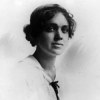Agnes Smedley

Agnes Smedley
Agnes Smedleywas an American journalist and writer, well known for her semi-autobiographical novel Daughter of Earth as well as for her sympathetic chronicling of the Communist forces in the Chinese Civil War. During World War I, she worked in the United States for the independence of India from the United Kingdom, receiving financial support from the government of Germany. Subsequently, she went to China, where she is suspected of acting as a spy for the Comintern. As the lover of...
NationalityAmerican
ProfessionAutobiographer
Date of Birth23 February 1892
CountryUnited States of America
Professors could silence me then; they had figures, diagrams, maps, books.... I was learning that books and diagrams can be evil things if they deaden the mind of man and make him blind or cynical before subjection of any kind.
Subjection of any kind and in any place is beneath the dignity of man ... the highest joy is to fight by the side of those who for any reason of their own making or ours, are unable to develop to full human stature.
I believe only in money, not in love or tenderness. Love and tenderness meant only pain and suffering and defeat. I would not let it ruin me as it ruined others! I would speak only with money, hard money.
Like all my family and class, I considered it a sign of weakness to show affection; to have been caught kissing my mother would have been a disgrace, and to have shown affection for my father would have been a disaster.
But there were years when, in search of what I thought was better, nobler things I denied these, my people, and my family. I forgot the songs they sung - and most of those songs are now dead; I erased their dialect from my tongue; I was ashamed of them and their ways of life. But now - yes, I love them; they are a part of my blood; they, with all their virtues and their faults, played a great part in forming my way of looking at life.
So I had to be the doctor to these wounded men until we could remove them to the hospital. There were fifty-four women and forty little boys with the Red Army prisoners, and I went daily to take care of them also.
In the little hall leading to it was a rack holding various Socialist or radical newspapers, tracts, and pamphlets in very small print and on very bad paper. The subjects treated were technical Marxist theories.
There's something dreadfully decisive about a beheading.
I joined another circle and the leader gave us a little leaflet in very small print, asking us to read it carefully and then come prepared to ask questions. It was a technical Marxist subject and I did not understand it nor did I know what questions to ask.
I have no objection to a man being a man, however masculine that may be.
No one yet knows what a man's province is, and how far that province, as conceived of today, is artificial.
When I was a girl, the West was still young, and the law of force, of physical force, was dominant.
Now, being a girl, I was ashamed of my body and my lack of strength. So I tried to be a man. I shot, rode, jumped, and took part in all the fights of the boys.
I have always detested the belief that sex is the chief bond between man and woman. Friendship is far more human.